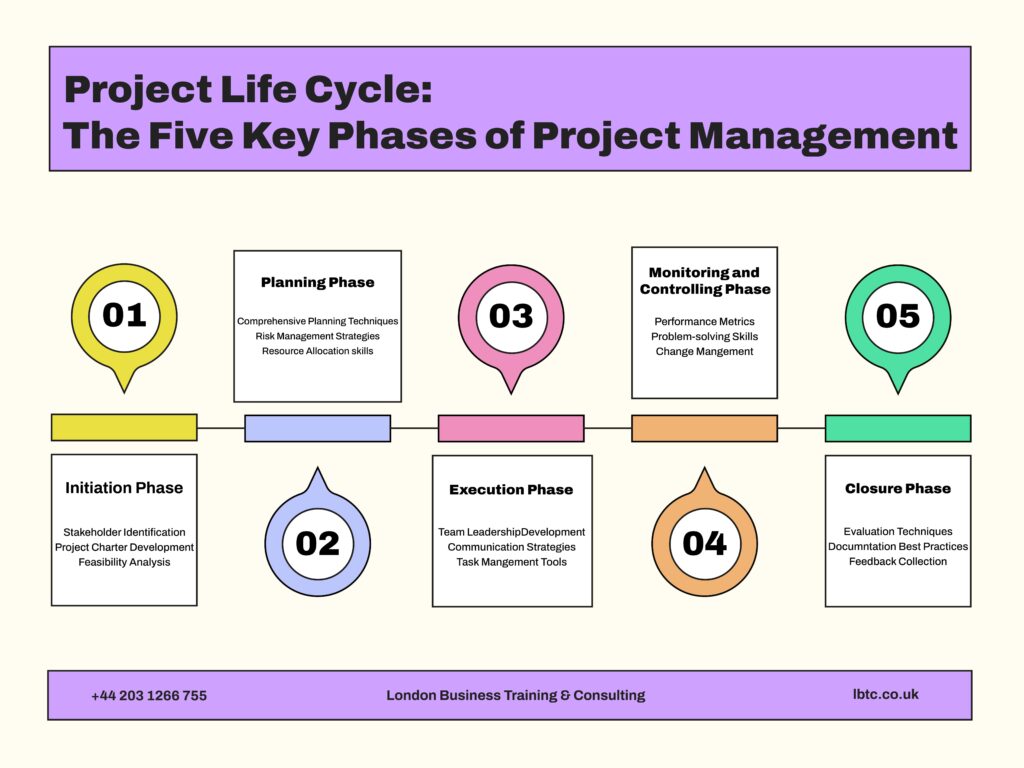
The project management area is diverse and blends competency areas, techniques, and general strategies. They are, of course, all necessary in any project management training, which will enable the project manager and team members to accomplish, if not survive, each given phase of the project life cycle. This is how training contributes to performance in all five phases of project management:
1. Initiation Phase
During the initiation period, the groundwork must be fully laid. Project management training provides trainees with the following:
- Stakeholder Identification: How to effectively identify and engage key stakeholders so that everybody’s needs and expectations are clear from the outset.
- Project Charter Development: Development of a clear and convincing project charter outlining goals, scope, and resources.
- Feasibility Analysis: With the knowledge gained during the training, team members will be able to evaluate project risks, costs, and technical feasibility, thereby ensuring that informed decisions can be made.
2. Planning Phase
In the planning stage, structured discipline is critical. This stage is further enhanced by:
- Various Planning Techniques: Trainees are taught to formulate project plans using techniques such as Work Breakdown Structures and Gantt charts that assist in better task management.
- Risk Management Strategies: Any worthwhile training program will encompass some degree of risk identification and response planning, thus allowing the project manager to be proactive in avoiding issues and minimizing their effect.
- Skill in Resource Allocation: PM training will impart knowledge about resource management, where project management teams are given the ability to allocate time, budget, and personnel optimally to achieve project goals.
3. Execution Phase
The execution phase is one where plans are brought to life. This phase is greatly assisted by training in the following ways:
- Enhancing Leadership Development: Project management training enables leadership skills, thus complementing the ability to motivate and direct members of the team.
- Communication Strategies: The development of communication plans that communicate with broad stakeholders enhances common understanding and encourages collaboration.
- Task Management Tools: Training on the use of different project management software gives project teams an opportunity to organize tasks, track progress, and facilitate enhancements in productivity.
4. Monitoring and Control Phase
Continuous monitoring during the period of monitoring and controlling is essential for the success of a project.
- Performance Metrics: Training helps in understanding KPIs and how to use them effectively in the measurement of project success, which would be helpful in measuring timely interventions.
- Problem Solving Skills: It trains a project manager with problem-solving ways to quickly find solutions when the project deviates.
- Change Management: Courses in project management very often have lessons on change control processes in order to help teams manage amendments in an efficient manner while still meeting the expectations of stakeholders.
5. Phase of Closure
The phase developed with the closure is an essential step in informing success through evaluation and documenting all lessons learned. Additions from project management training increase value in the following ways:
- Evaluation Techniques: Trainees learn to effectively carry out evaluations after the project, where their performance is viewed under the microscope, as are the results.
- Documentation Best Practices: One of the practical training modules would cover how to document and archive key project information that would ease the transfer of knowledge in future projects.
- Feedback Collection: Courses are usually focused on the need for stakeholders to give feedback, establishing the basis on which this information would be available for future improvement.
Conclusion
Investing in project management training becomes mandatory for achieving excellence during any part of the project life cycle. It leads to well-structured foundation-building, better planning, and endowing teams with skills required to execute as perfectly as planned for higher success at projects.
Organisations that want to impact their projects positively regarding efficiency and effectiveness will also see training as a core component of their project management strategy. It’s not going to be wise-it’s vital, even for long-term success. Whether starting project management or looking to sharpen your skills further, you can open doors to professional development opportunities that set you up for future success in navigating the project management process.

Leave a Reply